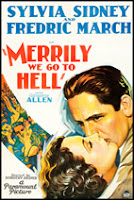Music: Louis Silvers Cinematography: Lucien Ballard
Starring: Peter Lorre, Edward Arnold, Marian Marsh and Robert Allen
Director Josef von Sternberg is hit-and-miss for me. While I feel his version of Theodore Dreiser’s An American Tragedy is one of the better films of the pre-code era, I also found Morocco to be one of the worst. His version of Dostoevsky’s Crime and Punishment falls somewhere in the middle. The biggest issue with the film for me is its adherence to the original material. Rather than try to reimagine it and make it something special, it feels a little claustrophobic in the way it clings so tightly to the well-known story—as if he were afraid of criticism for taking artistic license. The studio sets only add to the feeling of confinement. An American Tragedy benefitted tremendously from the abundance of exterior shots. Crime and Punishment, on the other hand, was shot completely on a sound stage. To be fair, it’s perhaps part of the subtext of the tale that Sternberg was going for, and that to open things up it would necessarily have diluted the feelings of emotional imprisonment he was trying to achieve. It’s a solid argument, but it also might have been better to work into that claustrophobia gradually, rather than impose it on the production right from the start. There’s no escaping the fact that Fritz Lang and Hitchcock were incredibly adept at shooting entirely in the studio, and that Sternberg doesn’t quite have the same facility. Even with all of the cinematic elements, it still feels like a filmed play. Nevertheless, it’s solidly directed, and it has a lot going for it—it’s also an interesting story—but in Sternberg’s hands it’s simply not very gripping.
The film opens at a college graduation with Peter Lorre as Raskolnikov receiving an award for high honors. But those honors don’t translate into a living, and with his clothes wearing out and his rent past due, he decides to sell his dead father’s watch at the pawnbrokers. There Lorre meets prostitute Marian Marsh and he’s moved by her plight, trying to take care of her mother and siblings while her father drinks away their money. At the same time, he feels that the old woman pawnbroker, Mrs. Patrick Campbell, doesn’t deserve to live and should be killed—a service to humanity, he calls it. When his mother and sister, Elisabeth Risdon and Tala Birell, bring Gene Lockhart over to his hovel of an apartment to announce he’s going to marry Birell, Lorre is upset by the news. Despite his poverty, his education has made him something of a snob. He’s sure his sister is marrying the very pompous Lockhart because he has money, but Lorre is also sure that she will not be treated well by him. At the very least, he doesn’t believe she loves him. It begins to tear Lorre apart that people’s very existence is so imprisoned by money, and he’s finally driven to kill the old woman pawnbroker, certain that he’ll never be caught, and take hers. Of course, the murder goes as planned, but a knock on the door sends him into a panic and he leaves without her money.
The conflict in Dostoevsky’s story centers on whether or not Raskolnikov will be able to live with himself. Will he be able to put his criminal act out of his mind and go on with his life, or will his conscience get the better of him and ultimately destroy him? Making matters worse is Edward Albert, playing a sort of jovial Javert to Lorre’s genuinely criminal Jean Valjean. Things get especially bad when an innocent man is arrested for Lorre’s crime, and Albert has no compunction at all about prosecuting him to the fullest extent of the law—meaning execution. Naturally, Albert doesn’t know any better—or does he? Lorre certainly does. And Edward Albert is fantastic, deserving his above the title credit in the film. Lorre is great as well, though he doesn’t come anywhere near the perfection he achieved in M, or for Hitchcock. Sternberg himself demonstrates some definite stylistic touches. For one thing, he’s not afraid of closeups. Rather than fear they would hark back to the silent era, as so many directors were afraid of in his day—and still are—they add a great deal to the cinematic palette and allow the actors to say a lot without dialogue. Louis Silvers’ film score is mostly recycled classical music, but it’s functional, as is the film as a whole. Crime and Punishment is a good film, not great one, of a classic story. And while one wishes it could have been better, it should be a positive experience for most viewers, especially fans of Peter Lorre.




